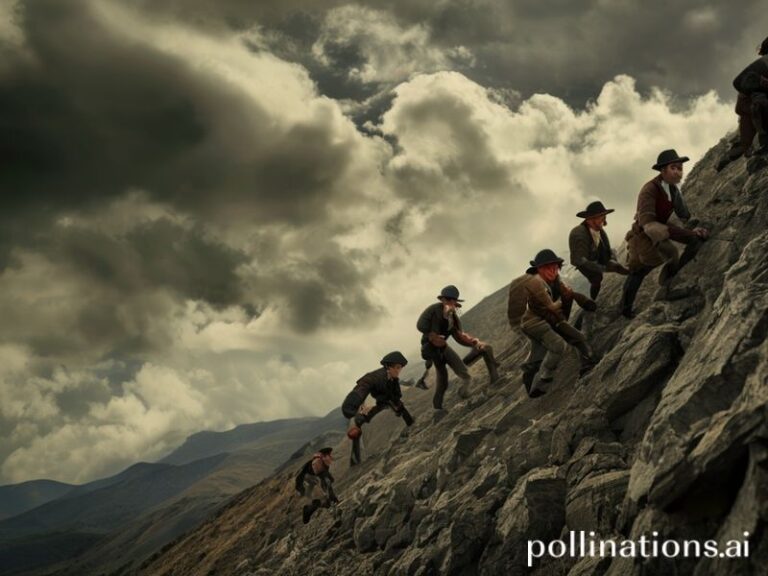From Lagos to Luxembourg: How Jake Knapp’s 5-Day Sprint Became the World’s Favorite Corporate Anxiety Patch
Jake Knapp and the Quiet Revolution of the 4-Hour Workweek—No, Not That One
We open, as all good international dispatches must, in Dubai Duty-Free at 03:14, where the fluorescent lighting is bright enough to perform minor surgery and the perfume fog could anesthetize a camel. Somewhere between the 12-euro Toblerone and the “I ♥ UAE” snow globes, a bleary-eyed German consultant is thumbing through Jake Knapp’s book Sprint on her phone. She’s hoping to compress next week’s stakeholder workshop into five days, unaware that Knapp’s original sprint at Google Ventures was designed to stop people like her from ever scheduling another 47-person Zoom. The irony is free; the latte is nine dollars.
From Silicon Valley’s air-conditioned panic rooms to a Lagos co-working container with one oscillating fan, Knapp’s gospel—design-sprint your way out of existential dread—has become the McKinsey-endorsed answer to late-stage capitalism’s favorite question: “How do we look busy while the planet melts?” Venture capitalists in Singapore quote him between bites of chili crab. NGOs in Bogotá run sprints to redesign refugee intake forms, because apparently empathy can be time-boxed. Even the French, who normally treat Anglo-Saxon productivity cults the way they treat skim milk, have begun sneaking sprint terminology into their Ministry of Digital Transformation. Liberté, égalité, sticky-notes.
Knapp himself, a mild Minnesotan who once described PowerPoint as “a loaded weapon pointed at our own feet,” never claimed to be Che Guevara in a hoodie. But ideas, like viruses and crypto scams, mutate in transit. What began as a tidy Monday-to-Friday recipe to test risky product ideas has metastasized into a global coping mechanism. Tokyo ad agencies sprint to rebrand whale sashimi; Riyadh accelerators sprint to rebrand whale oil. Everyone leaves on Friday feeling heroic, having produced a high-fidelity prototype and three new types of burnout.
The darker punchline? It works—sort of. A fintech in Nairobi used a sprint to shave 40% off customer-onboarding time, freeing thousands of unbanked users from paperwork Purgatory. Meanwhile, a European retailer used the same playbook to decide—after 35 Post-it iterations—that the optimal color for “Add to Cart” was panic-attack orange. Progress and parody share the same Miro board.
Zoom out and the pattern is unmistakable: Knapp’s little five-day miracle has become the West’s latest soft-power export, right between Marvel and obesity. Countries anxious to “innovate or die” import it the way they once imported the steam engine, except this engine runs on caffeine and passive-aggressive icebreakers. The UN Development Programme now trains civil servants in sprints to solve climate adaptation, which is a bit like teaching speed chess on the Titanic—admirably proactive yet existentially terrifying.
What’s truly global, though, is the emotional payload. From Belarus to Brisbane, knowledge workers share the same cortisol spike on Monday (“How can we map our problem in 45 minutes?”) and the same false euphoria on Friday (“We built a landing page—ship it!”). It’s a ritualized panic attack with catered lunch, and it sells because it compresses the unbearable open-endedness of modern work into a crisp narrative arc. If Kafka had worked in SaaS, he’d have loved a sprint: finite, bureaucratic, and you still feel vaguely guilty at the end.
So, as COP delegates sprint to draft pledges they’ll ignore and newsrooms sprint to redesign subscription pop-ups nobody reads, Jake Knapp watches from a Seattle coffee shop—probably amused, possibly horrified. His modest toolkit has become the Esperanto of late-capitalist anxiety: 123 pages, five days, one existential band-aid.
Conclusion? Knapp didn’t invent human folly; he just storyboarded it. The sprint ends, the stickers peel, and the world keeps warming. But for five neatly boxed days we get to pretend the future is a prototype we can still pivot. Pass the Post-its; the planet will still be here Monday. Probably.







